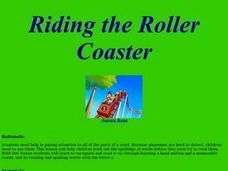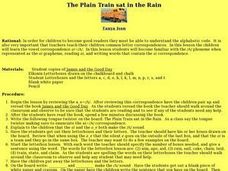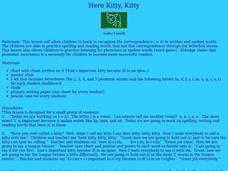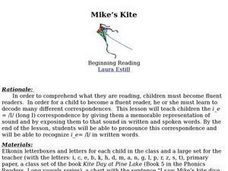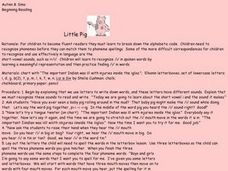Curated OER
Exciting E's "/e/...what did you say?" Exicing E's!
Students recognize the short /e/ sound in spoken and written words. They say a tongue twister which emphasizes words with the short /e/ sound. They then listen to the story "Red Gets Fed" and identify the words in the story with the...
Curated OER
You woke up the baby
Students recognize the short vowel a in written and spoken language. Through matching activities, they discriminate the short vowel /a/ in words and sentences. Students associate the phoneme with its letter representation and read...
Curated OER
What Did You Say?
Students recognize the short vowel E in written and spoken language. Through matching activities, they discriminate the short vowel /e/ from other phonemes. Students associate the phoneme with its letter representation and read pseudo...
Curated OER
Allie The Alligator
Students recognize the short vowel a in written and spoken language. Through listening activities, they discriminate the vowel sound /a/ from other phonemes. Students associate the phoneme with its letter representation and identify them...
Curated OER
Riding the Roller Coaster
First graders recognize the short vowel a in written and spoken language. Through matching and listening activities, they discriminate the vowel sound /a/ from other phonemes. Students associate the phoneme with its letter representation...
Curated OER
I Am Tired
First graders recognize the short vowel o in written and spoken language. Through listening and matching activities, they discriminate the vowel sound /o/ from other phonemes. Students associate the phoneme with its letter representation...
Curated OER
The Old, Creaky Door
Students recognize the short vowel e in written and spoken language. Through matching and handwriting activities, they discriminate the short vowel /e/ from other phonemes. Students associate the phoneme with its letter representation...
Curated OER
Alphabetic Acting
Students recognize the short vowel a in written and spoken language. Through matching activities, they discriminate the short vowel /a/ from other vowel phonemes. Students associate the phoneme with its letter representation and identify...
Curated OER
Ow! That Hurts
Students study the ou=/ow/ correspondence in written and spoken words using a tongue twisters and a letterbox lesson. They recite the tongue twister and make given words using the letterboxes. Next, they listen to a read aloud of Audrey...
Curated OER
Silly Sally Sings Upside Down!!!
Students use phonics to recognize the /s/ sound. As a group, students recite tongue twisters to recognize the /s/ sound. Students search through magazines to find objects that contain the /s/ phoneme.
Curated OER
Shhh Here and There
Students identify words containing the sh digraph in this lesson. They say a tongue twister which contains words emphasizing the sh digraph. They then read with a partner "One Fish, Two Fish, Red Fish, Blue Fish" and identify words in...
Curated OER
The Plain Train sat in the Rain
Students study the ai=/A/ grapheme by reading "James and the Good Day" with a partner and discussing it. Next, they recite a tongue twister focusing on the ai=/A/ correspondence. They make words using their letterboxes and letters before...
Curated OER
To Make a Cake you must say /A/
Here is a great way for learners to practice identifying sounds made by both short and long vowels. This lesson stresses the a_e=/A/ correspondence along with letterboxes. They read their spelled words, whole text selection and...
Curated OER
Don't Wake the Baby - Phonics
Students explore beginning reading through the use of phonics. They practice making the /sh/ sound and create a list of /sh/ words. Students practice saying tongue twisters containing /sh/ sounds. They model writing the s and h...
Curated OER
Here Kitty, Kitty
Students recognize the short vowel i in written and spoken language. Through matching activities, they discriminate the short vowel /i/ from other vowel sounds. Students associate the phoneme with its letter representation and identify...
Curated OER
Mike's Kite
Students explore the long /I/ sound as it is used in 'i_e' words. They recite a long /I/ tongue twister and use letterboxes to practice spelling 'i_e' words. In groups, they read a book with several long /I/ words and identify pictures...
Curated OER
Creaky Door e
First graders observe as the letter "e' is shown on the overhead projector and discuss the letter's name and what sound it makes. They compare the letter's sound to a creaky door and practice making the /e/ sound. They try saying the...
Curated OER
Sally Snake
Young scholars study the /s/ phoneme by examining the sound in written and spoken words. They recite a tongue twister, and examine how their mouths move as they make the sound. Next, they write the letter, differentiate the sound in...
Curated OER
Ehhh! Can you repeat that!
Young scholars assess how to recognize phonemes that stand for letters creating spoken words utilizing the short vowel /e/. They associate our written language as a secret code to solve. The tongue twister "Everybody saw Eddie and the...
Curated OER
Yummy in My Tummy
Students explore phonemes in spoken words. They discuss the correspondence u=/u/. Students identify a meaningful representation for the phoneme and practice identifying /u/ in both written and spoken words. Students learn a tongue...
Curated OER
Ah Ah Ah! Don't Do That!
Students become familiar with the alphabetic principle that letters stand for phonemes and spellings map out the phonemes in spoken words. They focus on identifying the short /o/ sound in spoken words and the tongue twister "Oscar Otter...
Curated OER
What's Behind the Creaky Door?
First graders are introduced to the concept that letters stand for the mouth moves that we make when sounds are made. They practice making the /e/ sound and compare it to the sound a creaky door makes and then try saying the tongue...
Curated OER
What's Up Doc?
Students demonstrate the /o/ sound by opening up their mouth and saying, "Ahhhhh". They try saying a tongue twister that contains the /o/ phoneme; repeating it two times together. They then practice writing the letter /o/ so that it can...
Curated OER
Little Pig
First graders discover that letters are used to write words and that they have different sounds. They pronounce the word, "pig" emphasizing the /i/ sound. They say a tongue twisters that features the /i/ sound in each word. They then...






